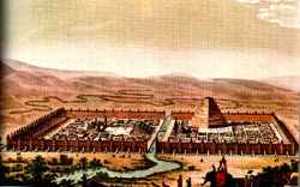 |
|
| Going to Nineveh |
|
| |
|
| If we consider the contemporary problems of our society one possibility is to be dead set against our present culture. Fortunately there is another way as suggested by three biblical writingsÉ of which the first one is: to go to Nineveh! |
|
| |
|
| “Go to Nineveh!” |
|
| (Book of Jonas 1,2) |
|
| |
|
| Jonas received from God the order to go to Nineveh and we know that his first reaction was, on the contrary, not to go. For Jonas Nineveh meant a culture that ignored his faith and his God, a culture with no reference to a God who reveals himself and makes an alliance with his people. This city was a great melting pot of all the cultures at that time. |
|
| |
|
 |
However God insisted “Go to Nineveh”. Finally Jonas felt enough concerned for the salvation of its inhabitants to invite them to be converted, which is to change their own standards and to learn to live differently. He brought the Jewish culture to them and showed them that other ways of thinking and living were possible and that was good for the people of Nineveh. |
|
|
| |
|
“Work for the prosperity of the city where you have been deported and pray
for it” (Jeremiah 29-7) |
|
| |
|
 |
The second writing is about the prophet Jeremiah who addressed to those, men and women, who have been deported to Babylon. They were dreaming to return to Jerusalem where they had benefited in the past of a religious unanimity; they wished to recover their certainties and to restore their old ways of doing. The prophet on the contrary tried to persuade them to involve themselves into that culture and to bring to it their positive contribution. This was strikingly anticipating the Sermon on the Mount: “Love your enemies, pray for those who persecute you”. History will show that Jeremiah was right, not only the Jewish community participated to the prosperity of Babylon but also this community itself was considerably enriched in its faith by being in exile in the middle of another culture. |
|
|
| |
|
| “Bad and lazy servant! You should have put your money in a banke “ |
|
| (Mathew 25, 26-27) |
|
| |
|
| Afraid to lose the money received from his master, the servant decided to bury the money securely into the ground. In our time some people would think that our Christian heritage is at risk and should be protected from the modernity and the new culture. |
|
| |
|
| These three texts invited us, on the contrary, to turn positively towards the present culture. We are invited to immerse ourselves into it, being confident that it will be a renewed Christianity, perhaps very different on some points from the past. It will not be the first time since two thousands years. |
|
|
|
| |
|

